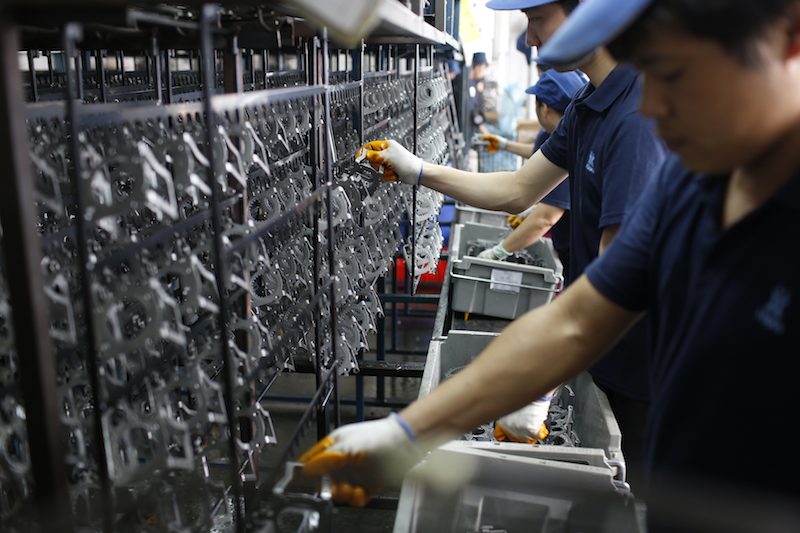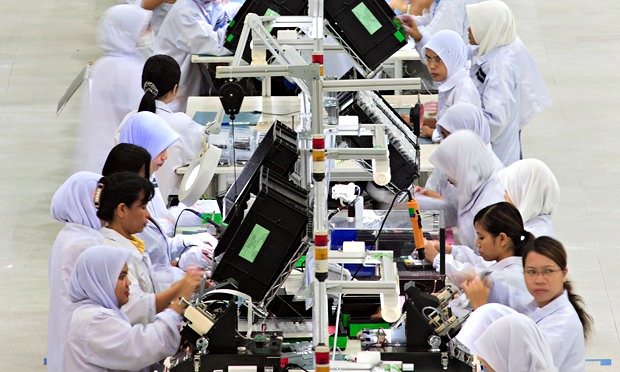Malaysia's Record Of Exploiting And Mistreating Migrant Workers Is Under Global Scrutiny
British daily The Guardian has published a series of articles that expose the lives of migrant workers in the electronic industry in Malaysia.
A series of reports by British daily The Guardian has sparked interest on the dark side of Malaysia's electronics industry
The articles that were published yesterday, 21 November, spoke of modern-day slavery in Malaysia, while our country puts itself on the world map as a key player in the global manufacturing and trade of advanced electronics, at the cost of migrant workers.
Foreign workers who were recruited to work in the industry have become the driving force behind Malaysia's electronic boom, but they continue to work and live in the most oppressive conditions.
The Guardian journalists have uncovered some of the most horrifying facts from their investigations following allegations of abuse
Migrant workers are forced to live in the worst living conditions.
Image via Pete Pattisson/The GuardianMost migrant workers came to Malaysia on the promise of a good salary and steady work but were cheated instead. Their pay is way below the minimum wage amount and work hours are extremely long to repay the huge recruitment debts that they took on to enter the country.
"We feel terrible because we have a big loan to pay back. You have to work for three years just to pay it off," a worker told The Guardian.
The workers claimed that people who tried to voice out dissatisfaction have suffered either through physical beating or were transferred to a worse place.
Not only are these workers deceived about their pay but they are also forced to work and live with very little freedom:
1. Their passports were confiscated
2. They had to pay large fines if they wanted to return to their home country before the end of their contract
3. They had been forced to work 14-hour shifts
4. They had been forced work with restricted toilet breaks
On top of these, the workers' residence were overcrowded as it was noticed that one particular hostel was filled with "14 men crammed into one mouldy room".
It was reported that the group of men "shared one broken toilet and two shower cubicles, which opened directly onto a cooking area with a single gas cooker".
Migrant workers at electronics companies have often lamented about their predicaments that have been widely publicised by the media
The recent articles by The Guardian investigated the lives of migrant workers working for Panasonic and Samsung, two of the world’s leading electronics brands. According to the reports, these workers were duped by their labour supply company.
"I wouldn't have come here if I had known the real conditions and salary. I was manipulated," a man reportedly said.
“[The labour supply company in Nepal] are using the name of Samsung to cheat people," another worker was quoted as saying by The Guardian.
"We have been cheated, but we don't want others to be cheated."
Both Samsung and Panasonic have vowed to get to the bottom of the issue
"We are currently conducting on-site investigations of labour supply companies we work with in Malaysia and the migrant employees hired by these companies. If any violations are uncovered, we will make immediate corrective actions and moving forward we will suspend our business with companies that are found to be in violation," a spokesperson from Samsung was quoted as saying by The Guardian.
Similarly, Panasonic too issued a statement and said that it has launched a probe into the matter and that it will not tolerate breaches of its CSR (Corporate Social Responsibility) policy and declaration.
"Panasonic will conduct a full investigation into the claims made by the Guardian. We are taking these allegations very seriously and if, in fact, we discover that one of our suppliers has violated such laws or regulations, we will ensure and require them to take necessary corrective action immediately," it said.
Over the last few years, Malaysia has been slammed under the limelight for ill-treating migrant workers, being named one of the worst nations to work in
Malaysia was named as one of the worst nations to work in, according to a report by the International Trade Union Confederation (ITUC) in 2014.
Similarly, a comprehensive study by Verité, a global NGO that monitors labour standard compliance, in that same year revealed that one out of three migrant workers were working in Malaysia under conditions of forced labour.
"This work has led us to conclude that forced labour in this industry is systemic and that every company operating in this sector in Malaysia faces a high risk of forced labour in their operations," Dan Viederman, chief executive of Verité, told The Guardian in 2014.
Malaysia will continue to be under public scrutiny as other nations pressure the country to implement measures to ensure the wellbeing of migrant workers
As pointed out by The Guardian, Malaysia is one of the 12 nations that has signed the Trans-Pacific Partnership Agreement (TPPA) which "theoretically prohibits the use of child and forced labour, and promises to combat the trade in goods made by forced labour both inside and outside of TPPA".
However, it is still unclear what laws will be amended and enacted in order to ensure that Malaysia complies with the standards set should this agreement materialise.
As this issue has been widely documented across Malaysia and beyond by human rights and labour groups, the world will be observing how the nation will respond to the matters concerning the use of child and forced labour.


